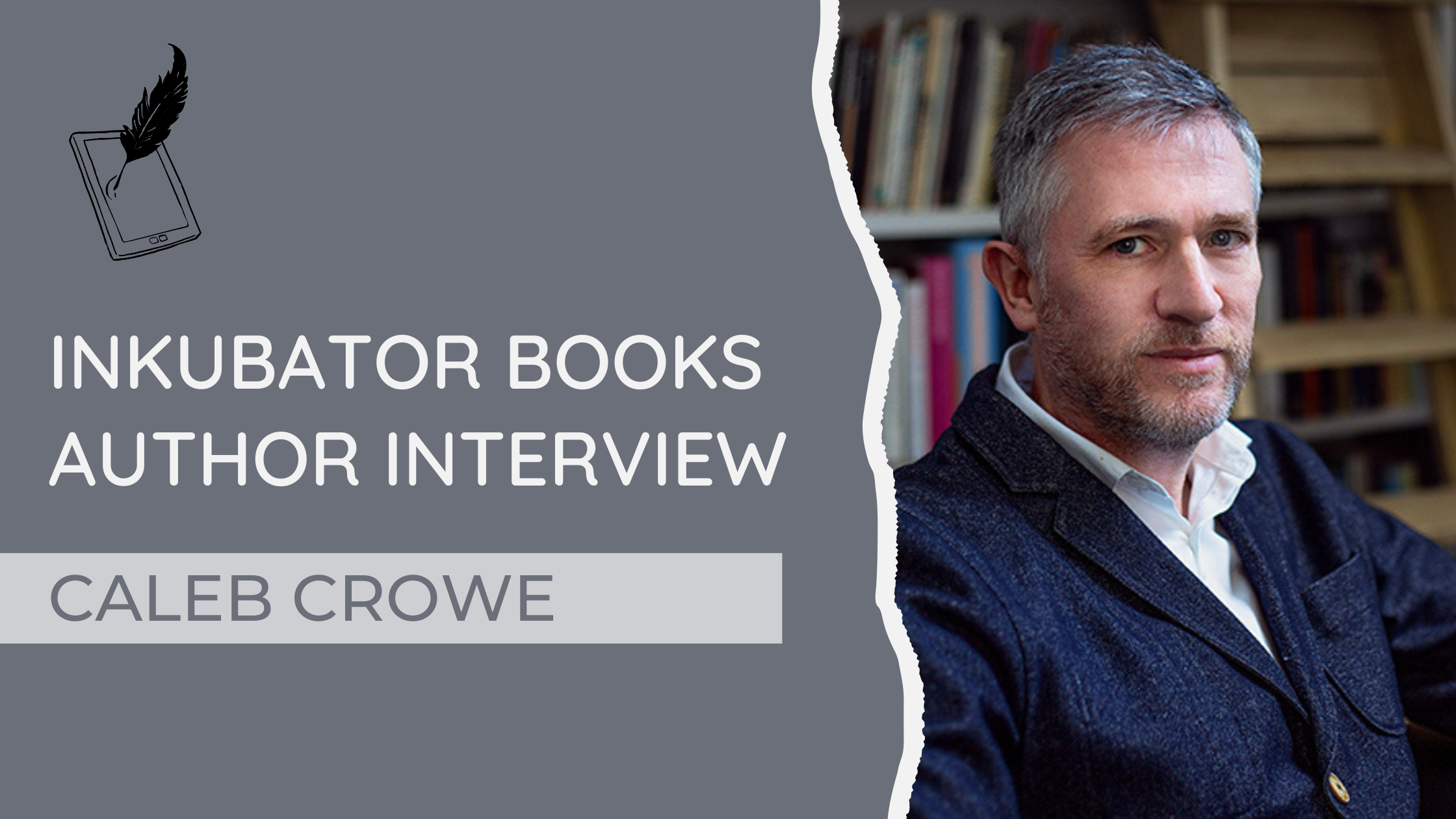Today, we’re speaking with Inkubator Books’ author Caleb Crowe. Caleb is the author of The Wrong Neighbour and The Girl in the Painting, as well as the soon to be released Never Let You Go.
Inkubator Books: When did you start writing?
Caleb Crowe: I’ve worked as a writer for pretty much all of my working life. I stared in theatre as a director and literary manager and wrote some plays then for stage and radio. Then I moved into television as a producer and wrote a bit for screen. But I only started novel writing last year. It’s all very new and exciting.
IB: What does a typical day of writing look like for you?
CC: There’s usually a school or nursery run with the kids. Some prevarication around the domestic chores. I’ll usually read back what I last wrote, printing out a hard copy and making corrections. Then I’ll start in on the new stuff. By the time I’m writing the first draft of my book I’ll already have outlined in great detail, so I don’t need to wait for inspiration to strike. I just start writing what I know needs to be in the chapter and kind of let myself get carried away with it. I write books with relatively short chapters, 2000 words or so, and usually aim to get one of those done a day.
IB: Do you base your characters off people you know or are they all the product of your imagination?
CC: Imagination, really. I hope, in this psych fiction genre, that I don’t have too many characters in my real life who are like the ones in my books! They’re interesting to read about, but you wouldn’t necessarily want to have dinner with them.
IB: What’s the most difficult part of your writing process?
CC: I really like all of it. I’m a meticulous planner, and don’t start writing a 300 page book until I have a 30 page outline. I’ve done that storylining all my life. The prose writing is the bit that is new to me, and so I guess once I get down to that I’m really enjoying it, because I’ve done all the hard work and I’m doing something new where I’m learning a whole new element of craft.
IB: What comes first for you – plot or characters?
CC: They kind of evolve together. It’s a genre that really needs a strong story, but the most important part in your book is what’s going on inside your main character’s head, so they essentially evolve hand in hand. The story is a bit more mechanical and abstract, but then when you start writing you really unlock the details of how someone thinks and feels. A couple of times a character has evolved in the writing in a way that has really surprised or delighted me. I know it’s a cliché to say that they have a life of their own, but once or twice I’ve found that to be the case.
IB: Which of your books is your favorite? Why?
CC: I think Never Let You Go is my favourite right now. I have tried something new to me structurally in a few different ways, and gone for something that gets deeper, darker and more intense as it goes on. I think it’s the best book I’ve written – but then I have thought that about each book so far, and hope I always will, that I’m getting better and raising the bar higher each time. But The Wrong Neighbour is also important for me because it took off commercially, established a fanbase for me and made me feel like I might be able to make novel writing my new career. I’d feel incredibly lucky if I can make this work as my job. I also have an enormous affection for my first book, The Girl in the Painting, because it was such a voyage of discovery into the unknown and felt like such an achievement.
IB: What are you doing when you aren’t writing?
CC: I have two young kids, so they dominate my time. And I do a lot of work with other writers, helping them shape their own books. I also still do some writing and producing for TV. In my spare time I love going to gigs and indulging myself in great pubs, bars and restaurants. I do enjoy having a busy and varied life.
IB: What does your writing space look like?
CC: I have a home office in my house. I like to work at a really big screen, and often have ambient music playing in the background. I can’t describe it in too much detail, as I have a running joke going with my newsletter subscribers about what my actual desk looks like. I’ll never tell!
IB: Have you ever traveled to research for a book?
CC: I’ve done the odd day trip for specific things. A family holiday to Anglesey inspired The Wrong Neighbour, and having a real, intimate knowledge of a location really helps to make the world of a book come alive. I love it when readers tell me that have a real sense of the places I set my books.
IB: What genres do you like to read? Who are some of your favorite authors?
|CC: I studied English Literature and love the classics. In 20th and 21st century literature, I really love writers who can write beautiful, literary prose that is also clear, unfussy and readable. Beryl Bainbridge, Ian McEwan, George Orwell, Graham Greene and Evelyn Waugh are a few who come readily to mind.
IB: How do you come up with names for your characters?
CC: I often search name lists. If I know a character’s age, I usually search popular names for that year, as they feel more credible. I avoid names of people I know. Sometimes characters have two or three names before one sticks. I also try to give all the characters names that start with different letters of the alphabet. It’s good to make it as easy for readers as possible.
IB: What was your favorite childhood book?
CC: it’s terrible to say, but I didn’t really read much as a kid. I loved comics, and I read and wrote my own comics and plays. I read play scripts as well. I didn’t really start reading for pleasure until I was eighteen. I think the love of reading comes like a switch being thrown in your head and you can’t force it. Now I have shelves heaving with books I fret I’ll never have time to read.
IB: Have you ever abandoned a book you were writing? How did you know it was the right thing to do?
CC: As I say, I outline really carefully. I can’t imagine I’d ever abandon a book, but I’ve certainly significantly changed outlines and the final book can be quite different to the initial starting story document. I have no idea how pantsers do what they do. I’m a committed planner.
IB: Do you have any tips for first-time authors?
CC: Writing is a craft. Just write. Nothing is stopping you, all you need is a pen. I sometimes see people say that they’d love to write, but they don’t know how to get a publisher. I think that’s a bit like saying you want to be in a band, then hiring Carnegie Hall, and then starting to learn to play the guitar. Writers write. I guess what goes hand in hand with that is reading a lot, and finding honest, skillful critics of your work. It looks like a solitary pursuit, but a good, trusted sounding board for your work is essential. Oh, and those AI programmes aren’t writing. I’ve had a play with them to see what’s going on, and they churn out mediocre bilge. That isn’t writing, it’s typing.
IB: If you could eliminate one thing from your daily life, what would it be?
CC: Sleep. What I could achieve with another seven hours a day!
IB: Do you have any pets?
CC: Cats. Devon Rexes. They have great, cheeky personalities and like to sit on my lap when I’m working. Also sometimes my keyboard…
IB: How do you approach your genre in a unique way?
CC: I think it’s madness to try to pursue uniqueness. Understand the genre you’re writing in, really polish your story and the details of your text, find your voice and the voice of your characters and write as well as you possibly can.
IB: How do you manage the “whodunit” aspects of your story as far as clues and revelations? Do you outline?
CC: I outline really carefully. I’m not a fan of massively twisty stories with unseeded surprises coming in from left, right and centre. I hope to surprise and delight my readers with where the story goes, but I want those plot developments to feel organic and like they grow credibly from what’s gone before.
IB: How do you relax?
CC: I really like TV and films. I like watching really good stuff where someone has already done all the hard thinking.
IB: Who are your first readers when you write a new book?
CC: Mrs Crowe – my biggest fan and harshest critic.
IB: What’s one thing you wish your readers knew about you?
CC: I think my secrets make me all the more mysterious.
Thanks to Caleb Crowe for sitting down with us today.
Want to read Caleb’s books? Check out his titles on Amazon.
You can find Caleb here:
Facebook
www.calebcrowe.com

